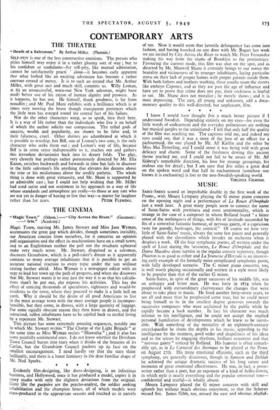THE CINEMA
Magic Town." (Odeon.)—" City Across the River." (Gaumont.) --- Iris." (Academy.)
Magic Town, starring Mr. James Stewart and Miss Jane Wyman, accentuates the great gap which divides, though sometimes invisibly, our American cousins from ourselves, for it concerns an opinion poll organisation and the effect its machinations have on a small town; and to an Englishman neither the poll nor the resultant upheaval make very much sense. Mr. Stewart, disguised as a salesman, discovers Grandview, which is a poll-taker's dream as it apparently contains so many average inhabitants that it is possible to get an accurate national reaction to every topic under the sun without casting further afield. Miss Wyman is a newspaper editor with an urge to lead her town up the path of progress, and when she discovers that Mr. Stewart wants it to stay just the way it is so that his calcula- tions shan't be put out, she exposes his activities. This has the effect of enticing thousands of speculators, sightseers and would-be residents to the town, where they proceed to make it a little hell on earth. Why it should be the desire of all good Americans to live in the most average town with the most average people is incompre- hensible, but they come, in droves, with a large quantity of luggage. For some equally obscure reason they then leave in droves, and the ostracised, sullen inhabitants have to be cajoled back to zestful living by a repentant Mr. Stewart.
This picture has some extremely amusing sequences, notably one in which Mr. Stewart recites "The Charge of the Light Brigade" at the same time as Miss Wyman recites "Hiawatha " ;,and it also has some painfully sentimental ones. I do not know whether the Horsham Town Council bursts into tears when it thinks of the beauties of its Carfax, but the Grandview Council puckers up its face on the smallest encouragement. I need hardly say that the stars shine brilliantly, and there is a lesser luminary in the dear familiar shape of Mr. Ned Sparks.
* * *
Evidently film-designing, like dress-designing, is an infectious business, and Hollywood, once it has produced a model, copies it in every studio with only the slightest deviations from the original. Gone like the guepiere are the psycho-analyst, the soldier seeking rehabilitation and the champion boxer, all of which models were mass-produced in the appropriate seasons and reached us in parcels
of ten. Now it would seem that juvenile delinquency has come into fashion, and having knocked on any door with Mr. Bogart last week we are invited by City Across the River to watch Mr. Peter Fernandez making his way from the slums of Brooklyn to the penitentiary. Favouring the current mode, this film was shot on the spot, and as directed by Mr. Maxwell Shane it certainly brings to our notice the brutality and viciousness of its younger inhabitants, laying particular stress on their lack of proper homes with proper parents inside them. With both fathers and mothers working, these youths roam the streets like embryo Capones, and as they are past the age of influence and have yet to prove that crime does not pay, their cockiness is fearful to sec. Mr. Shane does not moralise ; he merely shows ; and it is most depressing. The cast, all young and unknown, add a docu- mentary quality to this well-directed, but unpleasant, film.
* *
I know I would have thought Iris a much better picture if I understood Swedish. Depending entirely on my eyes—for even the little words of endearment and the everyday politenesses are nothing but musical gargles to the uninitiated—I felt that only half the quality of the film was reaching me. The captions told me, and indeed my eyes could see, that it was a story of the love of an officer for a parlourmaicl, the one played by Mr. All Kjellin and the other by Miss Mai Zetterling, and I could sense it was being told with great delicacy and charm. Some of the freshness dewing this ancient theme reached me, and I could not fail to be aware of Mr. Alf Sjiiberg's• remarkable direction, his love for strange groupings, his zealous eye for detail ; but I am sure that Iris relies a great deal on the spoken word and that half its enchantment (somehow one knows it is enchanting) is lost to the non-Swedish-speaking world.
VIRGINIA GRAHAM.


































 Previous page
Previous page